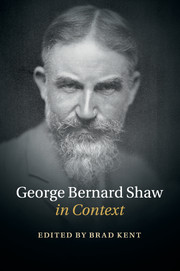Book contents
- Frontmatter
- Dedication
- Contents
- List of illustrations
- Notes on contributors
- Preface
- Acknowledgements
- A Chronology of Shaw's Works
- List of abbreviations
- PART I PEOPLE AND PLACES
- PART II THEATRE
- 7 The Abbey Theatre
- 8 Actors and actresses
- 9 The Court Theatre
- 10 Fabian drama
- 11 Farcical comedy
- 12 History plays
- 13 Melodrama
- 14 The New Drama
- PART III WRITING AND THE ARTS
- PART IV POLITICS
- PART V CULTURE AND SOCIETY
- PART VI RECEPTION AND AFTERLIFE
- Further reading
- Index
- References
11 - Farcical comedy
from PART II - THEATRE
Published online by Cambridge University Press: 05 October 2015
- Frontmatter
- Dedication
- Contents
- List of illustrations
- Notes on contributors
- Preface
- Acknowledgements
- A Chronology of Shaw's Works
- List of abbreviations
- PART I PEOPLE AND PLACES
- PART II THEATRE
- 7 The Abbey Theatre
- 8 Actors and actresses
- 9 The Court Theatre
- 10 Fabian drama
- 11 Farcical comedy
- 12 History plays
- 13 Melodrama
- 14 The New Drama
- PART III WRITING AND THE ARTS
- PART IV POLITICS
- PART V CULTURE AND SOCIETY
- PART VI RECEPTION AND AFTERLIFE
- Further reading
- Index
- References
Summary
A drama critic who was dispatched to review a ‘farcical comedy’ in the year 1895 could barely conceal his annoyance – he had seen it all before. ‘Our farcical comedies’, he wrote, ‘are all modeled on much the same lines, we are beginning to perceive, and novelty in their plot is becoming a rare quality’. By that time, characters in farcical comedy were no longer throwing bacon and chops across the stage or discovering infants under meat platters, as their predecessors had done in popular one-act farces like John Maddison Morton's Box and Cox (1859) and W. E. Suter's The Lost Child (1863). The slapstick comedy of earlier farces had given way for the most part to laughter more verbal and less crudely physical, framed in narratives of love, marriage, and romantic and sexual intrigue, often inspired by adaptations from the French. Bernard Shaw, although contemptuous of what he called ‘the farcical comedy outbreak’ of the 1890s and the ‘galvanic’ laughter that he attributed to it (OTN II: 118, 124), was hardly immune to the attractions of farce in his own play writing. He introduced many of the generic markers of farcical comedy in his plays, most notably in The Philanderer and especially You Never Can Tell, but would continue to disparage the genre on the whole as a disgrace to humanity.
But we should not accept too uncritically Shaw's assessment of contemporary farce as mechanical and inhuman. Not only does this sweeping indictment of farcical comedy leave little room for appreciating the disarming fun of plays like Clo Graves's all-too-soon-forgotten A Mother of Three (1896), Brandon Thomas's Charley's Aunt (1892), and W. S. Gilbert's Engaged (1877), it also produced Shaw's oddly skewed critique of the most notable play of its kind in the 1890s, or perhaps any period, Oscar Wilde's The Importance of Being Earnest (1895). In his review of Wilde's play, Shaw confessed that he was amused by Earnest and laughed as much as anybody in the audience – but it was a ‘miserable mechanical laughter’, he added, provoked by a formulaic farce that cancelled any sense of ‘reality’ and ‘humanity’. All in all, Earnest offered only ‘stock mechanical fun … for instance, the lies, the deceptions, the cross purposes, the sham mourning, the christening of the two grown-up men, the muffin-eating, and so forth’.
- Type
- Chapter
- Information
- George Bernard Shaw in Context , pp. 85 - 93Publisher: Cambridge University PressPrint publication year: 2015



